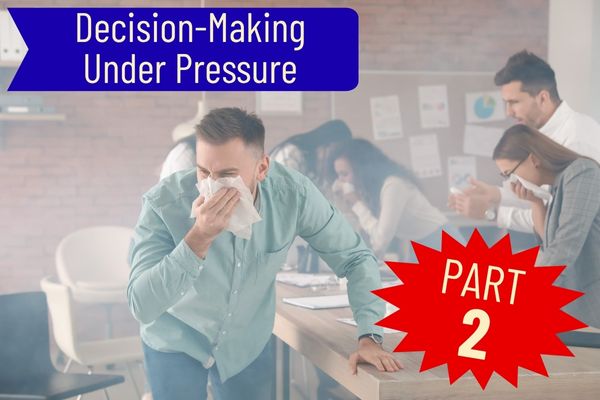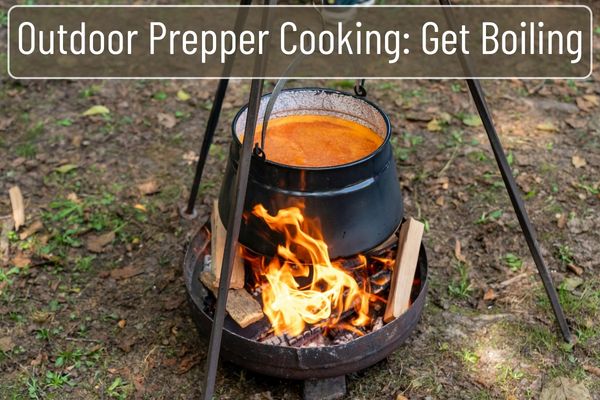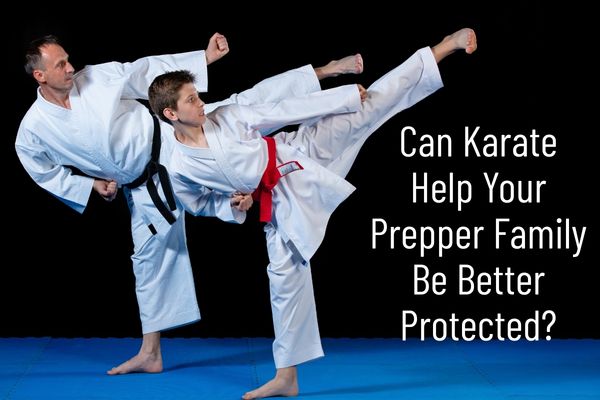In Part 1, we discussed why decision making under pressure is an important part of prepping.
Also discussed was the importance of learning the “S.T.O.P. method” and the order of survival priorities as specified under the “Survival Rule of Threes.”
So, let’s now delve into the importance of proper training for both the mind and body to sharpen your decision-making skills.
Preparing the Mind and Body
So now you have an impressive stockpile of food and supplies. You practiced the “S.T.O.P. method (Stop, Think, Observe, Plan), and have created thoughtful plans and backup plans. Now it’s time to work on uniting both your mind and body to work in perfect unison.
Combining mental and physical preparedness is important. Think about the expression, “mind over matter.” Your mind may know how to face a dangerous situation, but your body needs to be able to perform the necessary actions to back up the decision-making process.
By preparing both mentally and physically, you’re building a foundation to help you face and overcome unexpected emergencies with more confidence.
Mental Toughness and Mental Resilience
Mental toughness can help you maintain focus to make quick, effective decisions. Mental resilience kicks in when your chosen plan hits a roadblock and quick adjustments are necessary for a new course of action. Your ability to quickly adapt is critical for making lifesaving decisions.
The good news is that mental toughness training can boost your mental resilience, while it enhances your decision-making ability. In other words, this training can help you adapt, thrive, and survive during high-stress scenarios.
The combination of both skills and mental toughness can make you more effective in high-pressure environments.
How Physical Fitness Impacts Decision Making
Physical and mental strength can help you confidently persevere through high-pressure situations. Physical conditioning can help prepare your body for the strenuous demands created by emergencies. Have you ever tried to think clearly while physically exerting yourself. It’s hard. When one is struggling for their next breath because of physical activity, it’s difficult to keep thoughts ordered. The greater one’s endurance, the more one is able to think effectively while physically working .
Enhance Mental/Physical Skills For Decision Making Under Pressure
Imagine someone who is bugging out and is exhausted from hiking with a heavy bug out bag. That person, who has skills in using natural shelters like caves or rock overhangs might be too tired to spot a perfect spot to shelter for the night. Or they might set up camp and miss signs of flooding or rockslides, because of fatigue.
You might say that training now could help to build both mental and physical muscle memory that you’ll need to rely on later. Skills have to be learned so preppers have the know-how, but the body has to be prepared so that the mind can access those skills.
Here are a few ways to build skills that will back up your quick decisions:
:: Simulate prepper survival scenarios such as being stranded in the wild, facing a medical emergency, building a shelter, and finding food and water.
:: Continually develop survival skills such as purifying water, hunting and fishing, administering first aid, and more.
:: Maintain physical fitness so that physically difficult situations don’t diminish your ability to think and reason.
Practice and Training With Realistic Simulations
Let’s take a look at the training done by the Navy SEALs. The mental resilience to thrive under the most grueling and intense situations can only be described as extreme mental fortitude. What is mental fortitude? While mental toughness refers to the ability to “remain resilient and focused” under pressure, metal fortitude emphasizes the “endurance and perseverance” in the face of adversity. Training mental fortitude involves learning to quickly adapt to situations through physical fitness, maneuvering challenging obstacle courses, and excelling in high-pressure team exercises.
Consider facing an unexpected situation, like a ceiling collapse during a natural disaster. With adrenaline pumping, you’ll need to quickly change gears to remain calm, stay composed, and act accordingly. Learning the skills to manage intense situations is key to developing mental toughness. The more you practice decision-making under mock pressure, the more effectively you will respond in real emergencies.
Here are a few simulated emergencies that you can practice:
:: Wilderness training during a camping trip. Test your skills with unexpected emergencies such as first aid, getting lost, purifying water, starting a fire, facing a bear, and more.
:: Mock drills are a great way to test your reaction time. This can be as simple as a mock fire drill when you need to escape the house from the 2nd floor.
:: Timed running and hiking can simulate the need to get from Point A to Point B quickly. Can the person keep their wits while pushing their body to move faster?
:: Participate in mazes and escape rooms to test problem solving skills.
Preparedness training with realistic simulations improves confidence and mental toughness, resilience, and fortitude. By simulating high-pressure emergency situations, you’ll learn to stay calm, focused, and think effectively.
Practice Stress Management Methods
Stress and anxiety can hinder decision making, so you can understand the dire need to manage stress for optimal performance
Here are a few stress management methods:
:: Deep breathing exercises
:: Meditation
:: Mindfulness and grounding
Remember, high-pressure situations demand both physical and mental strength so training now to enhance both your mental well-being and physical health is essential during challenging scenarios.
Develop Positive Thinking
It’s often said that positive thinking can help with all aspects of life. That same recommendation holds true with decision making under pressure. Positive thinking isn’t just about feeling good in a situation, but more about strategically altering your mental thought process. Positive thinking can help shift your focus from “deer in the headlights” fear to making quality decisions. Of course, in an emergency, this entails the quickest of mind shifting from negative thoughts to focusing on positive solutions and problem solving.
Learn From the Experiences of Others
There’s a difference between obsessing about worst-case scenarios and preparing for any situation. Consider doing some homework to find books and videos that tell of real-life stories of survival. Others sharing their own stories can provide much-needed food for thought. By hearing other people’s stories, you can gain much-appreciated knowledge that may one day make a difference in your own life.
Navigate Your Decision-Making With Confidence
Preparing your mind and body to meet the demands of survival situations is something every prepper can do right now. Prepare now and be ready when it matters.
While prepper skills and training will support the decisions you make under pressure … mental toughness, resilience, and fortitude will enhance your problem-solving skills and increase your chances of survival. Remember, mental preparation is just as important as physical preparedness when it comes to surviving and thriving in challenging circumstances.




